
Scilla is a genus of about 30 to 80 species of bulb-forming perennial herbaceous plants in the family Asparagaceae, subfamily Scilloideae. Sometimes called the squills in English, they are native to woodlands, subalpine meadows, and seashores throughout Europe, Africa and the Middle East. A few species are also naturalized in Australasia and North America. Their flowers are usually blue, but white, pink, and purple types are known; most flower in early spring, but a few are autumn-flowering. Several Scilla species are valued as ornamental garden plants.

Scilloideae is a subfamily of bulbous plants within the family Asparagaceae. Scilloideae is sometimes treated as a separate family Hyacinthaceae, named after the genus Hyacinthus. Scilloideae or Hyacinthaceae include many familiar garden plants such as Hyacinthus (hyacinths), Hyacinthoides (bluebells), Muscari and Scilla and Puschkinia. Some are important as cut flowers.

Kniphofia is a genus of perennial flowering plants in the family Asphodelaceae, first described as a genus in 1794. Species are native to Africa. Common names include tritoma, red hot poker, torch lily and poker plant.

Gerbera L. is a genus of plants in the Asteraceae (Compositae) family. The first scientific description of a Gerbera was made by J. D. Hooker in Curtis's Botanical Magazine in 1889 when he described Gerbera jamesonii, a South African species also known as Transvaal daisy or Barberton daisy. Gerbera is also commonly known as the African daisy.
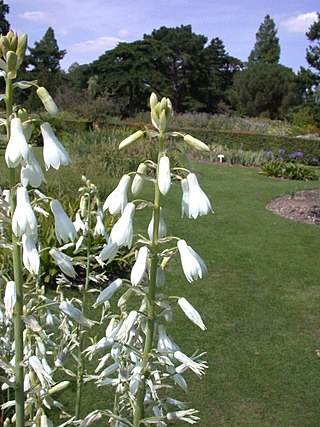
Galtonia is a genus of plants in the family Asparagaceae, subfamily Scilloideae. Native to Southern Africa, the genus is named after Sir Francis Galton. According to some authorities it has been subsumed into Ornithogalum as a subgenus, while others prefer to keep it as a separate genus.

Massonia is a genus of bulbous perennial flowering plants in the family Asparagaceae, subfamily Scilloideae. It is native to southern Africa, and is found in localities such as Namaqualand with hot and dry summers, being dormant in summer and growing during winter. The genus Whiteheadia has been merged into Massonia. It is classed as a cryptophyte.

Aloidendron barberae, formerly Aloe bainesii and Aloe barberae, also known as the tree aloe, is a species of succulent plant in the genus Aloidendron. It is native to South Africa northwards to Mozambique. In its native climes this slow-growing tree can reach up to 60 feet (18 m) high and 36 inches (0.91 m) in stem diameter. Aloidendron barberae is Africa's largest aloe-like plant. The tree aloe is often used as an ornamental plant. Its tubular flowers are rose pink (green-tipped); it flowers in winter and in its natural environment is pollinated by sunbirds.
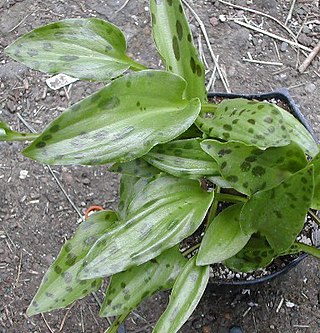
Drimiopsis is a genus of African bulbous perennial herbs in the family Asparagaceae, subfamily Scilloideae, native to sub-Saharan Africa. Sometimes species are placed under the genus Ledebouria.
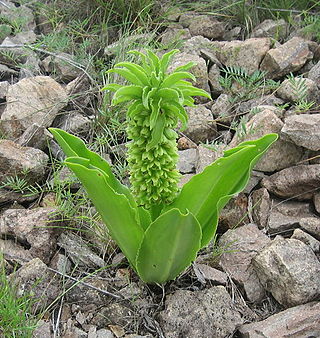
Eucomis is a genus of flowering plants in the family Asparagaceae, subfamily Scilloideae, native to southern Africa. Most species of this genus are commonly referred to as pineapple flowers or pineapple lilies. They are bulbous perennials with basal rosettes of leaves and stout stems covered in star-shaped flowers with a tuft of green bracts at the top, superficially resembling a pineapple – hence the common names.

Albuca is a genus of flowering plants in the family Asparagaceae, subfamily Scilloideae. The genus is distributed mainly in southern and eastern Africa, with some species occurring in northern Africa and the Arabian Peninsula. Plants of the genus are known commonly as slime lilies.

Dracaena aletriformis is commonly known as the large-leaved dragon tree. These plants are found in forest in the eastern areas of South Africa from Port Elizabeth to northern and eastern Limpopo. They are also found in Eswatini, but are most common in the coastal and dune forests of KwaZulu-Natal.

Drimia is a genus of flowering plants. In the APG IV classification system, it is placed in the family Asparagaceae, subfamily Scilloideae. When broadly circumscribed, the genus includes a number of other genera previously treated separately, including Litanthus, Rhodocodon, Schizobasis and Urginea.
Pseudoprospero is a genus of bulbous flowering plants in the family Asparagaceae, subfamily Scilloideae. The genus has a single species Pseudoprospero firmifolium, which is endemic to South Africa.

Marie Prins is a South African botanist.
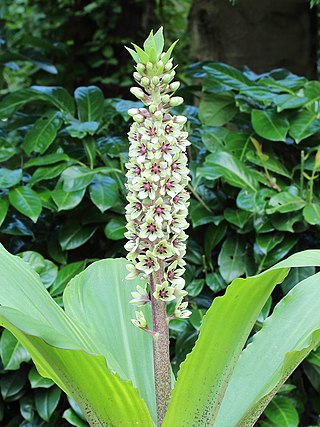
Eucomis montana is a plant species in the family Asparagaceae, subfamily Scilloideae, found in South Africa and Eswatini (Swaziland). When in flower in summer, the plant reaches a height of up to 45 cm, with a dense spike (raceme) of greenish flowers, topped by a "head" of green bracts.

Albuca shawii is a species of bulbous plant from southern Africa. It flowers in the summer and has yellow flowers on stems to about 30 cm high.
Eucomis schijffii is a bulbous species of flowering plant in the family Asparagaceae, subfamily Scilloideae, native to the Cape Provinces, KwaZulu-Natal and Lesotho. It was first described by William Frederick Reyneke in 1976. The reddish purple flowers appear in summer and are arranged in a spike (raceme), topped by a "head" of green leaflike bracts. It is cultivated as an ornamental plant and can be grown successfully outside where frosts are not too severe. The smallest of the species of Eucomis, it is particularly suited to being grown in rock gardens or containers.
Austronea is a genus of flowering plants in the family Asparagaceae, found in Namibia and South Africa. It is sister to Fusifilum.
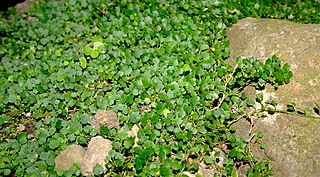
Wimmerella is a genus of flowering plants belonging to the family Campanulaceae. It is also in the Lobelioideae subfamily.

Ledebouria ovatifolia, the flat-leaved African hyacinth, is a widespread species of bulbous flowering plant in the family Asparagaceae, native to South Africa and Lesotho. With its highly variable spotted leaves and attractive flowers, it is popular with succulent enthusiasts, although it is not, strictly speaking, a succulent.















